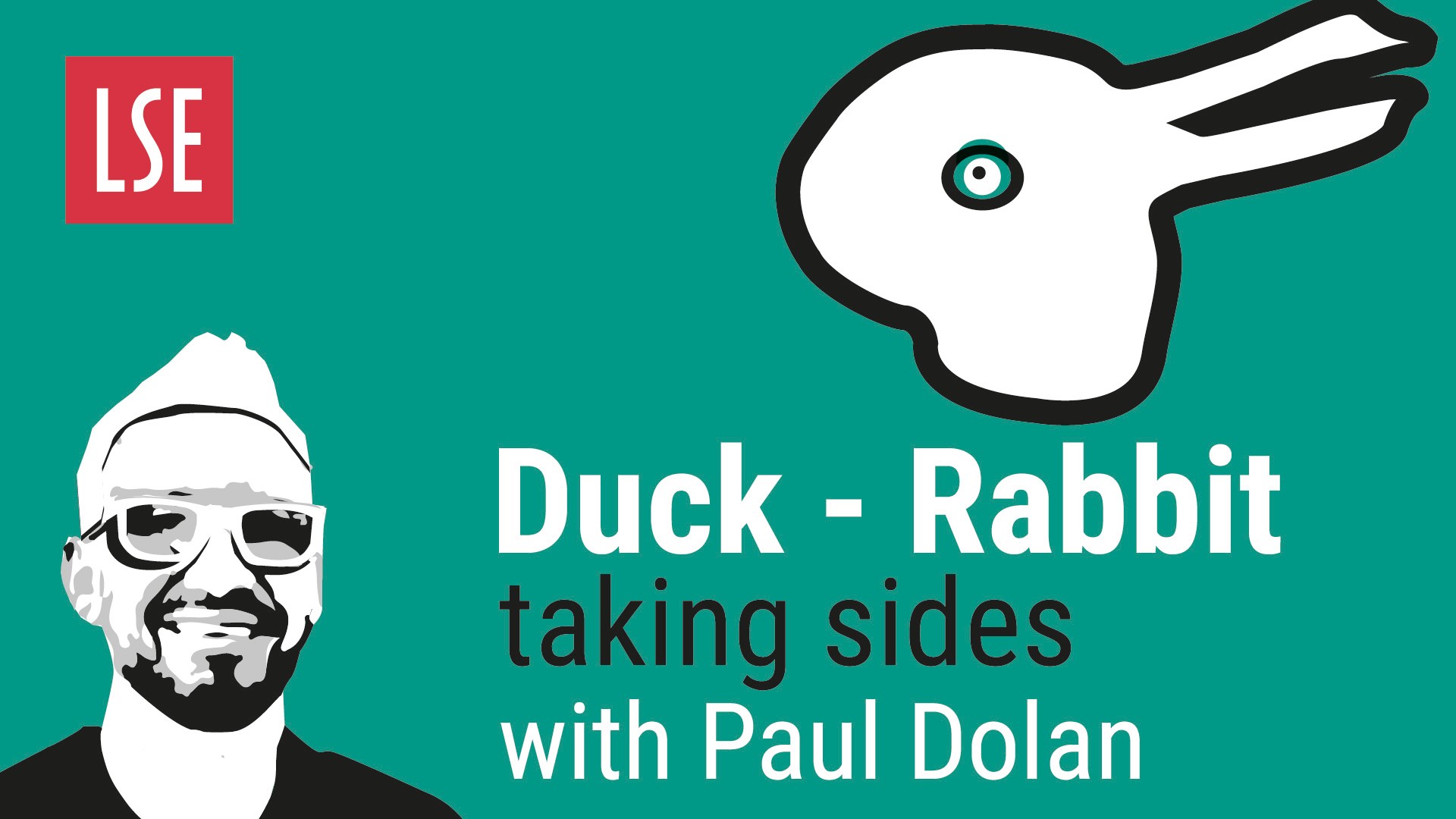Paul Dolan (LSE) introduces his new Duck-Rabbit podcast.
Think of this: you’re shown a picture, it’s black and white and sort of blurry, and you are asked what animal you see. You look closely and you see that it’s a duck. You are then told it could be a rabbit too. Ah yes, maybe, but it’s still mostly a duck. In fact, you’re not sure how anyone could really see a rabbit.
That’s true of life, isn’t it? Think about Brexit, COVID, climate change, and pineapple on pizza – once we’ve chosen our tribe, we rarely change our minds and see the other side. Can we even understand how others could come to a different conclusion to us? Do we even know anyone who sees a rabbit when we see a duck? There are many good reasons why we like to see the world in a simple way, stick to that image, and surround ourselves with people who agree with us.
But maybe, in a post-COVID world, we could all be a bit happier by embracing difference, or at least from accepting that another point of view exists? Perhaps if we could understand why we see the world differently, we will be more able to accept each other. We also share many more similarities than differences: whether we see a duck or a rabbit, we all see an animal, after all.
I explore this polarisation problem in my new Duck-Rabbit podcast. The first five episodes cover some of the most divisive issues in our society today (some of which may surprise you): relationships; security and liberty; freedom of speech; lifestyle; and social class. I have spoken to commentators, politicians, activists, and academics to try to understand where some of the fault lines in these debates lie. In all episodes, I have had a chat with my old mate, Rory Sutherland, who is Vice Chair of Ogilvy and an expert on human behaviour. We have conducted Twitter polls and heard from members of the public.

The first episode – on marriage, monogamy, and kids – was born out of a talk I gave at the Hay Festival, where I suggested if they wanted to be happy, men should marry but women should stay single. It touched a nerve. Not only are single women assumed to be lonely and believed to be happier if in a relationship, but they can face discrimination in the workplace. Why do we care so much?
Turning to security and freedom, I was particularly keen to understand whether COVID has changed the relationship between the two, as well as our relationship with the state. I wanted to explore the trade-offs between protecting human life and the freedom to live our lives, and what the public thought of the choices made by government.
In freedom of speech, I explored cancel culture and causing offence. Is the possibility of causing offence a good enough reason to restrict free speech? We already have laws against hate speech, so is cancel culture just a way to silence those who disagree with us? Or has this been deliberately misrepresented by the right-wing press?
For the lifestyle episode, I consider how some of us are becoming ever fitter whilst many others are becoming ever fatter. Not only are our behaviours becoming polarised, but our judgements of those behaviours are too. What makes us laud CrossFit and lambast cream cakes? Is climbing Kilimanjaro so much better for us than taking ketamine?
Last up, a subject close to my own heart: social class. Does class still divide us? Is it defined by occupation, or by taste? Or are we now a classless society? It’s been fun talking about all the issues with Rory, but especially this one, given how posh he is.
It’s a cliché to say I went on a journey making these episodes, but I did change my mind about some issues and become even more convinced about my views on others. I won’t spoil my personal conclusions from each episode, and actually it’s not important whether you agree with me – or with Rory or with any of my guests. Life would be very dull indeed if we all agreed.
What matters to me is that we can all become a little more accepting of the differences between us – and reminded of the similarities too. As you listen, you might get angry, or defensive, or dismissive. Be alert to that response – the one that drives us into easier conversations with people we agree with or provokes us into arguments where we simply talk over one another.
I really hope you enjoy these episodes, but also maybe feel a little uncomfortable in places, and perhaps even start seeing a rabbit where you once only saw a duck.
LSE’s Shaping the Post-COVID World initiative convenes a debate about the direction the world could and should be taking after the COVID crisis.
This post represents the views of the author and not those of the COVID-19 blog, nor LSE.






Well, democrazy involves in its concept to be tolerant towards different opinions whatever the item is. Not only tolerant but the way we live in modern societies. You may see a duck AND accepts that I rather see a rubbit.